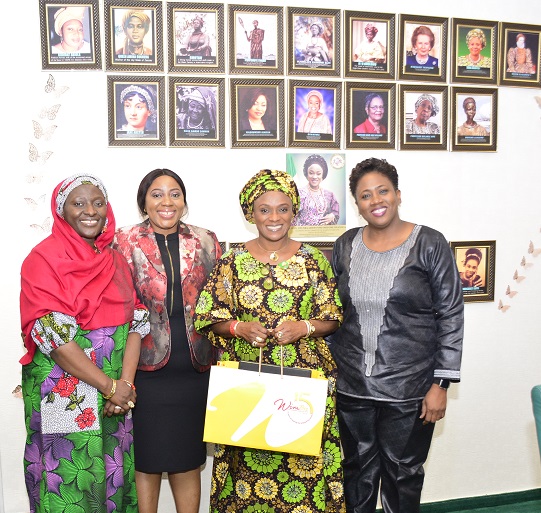Advocacy

WIMBIZ ADVOCACY
In accordance with the WIMBIZ vision and core pillars, WIMBIZ advocacy seeks to lend its voice and support for gender parity as well as the increase in the representation of women in leadership positions in business, management, and public service. Overall, it seeks inclusive and sustainable economic growth in Nigeria through the promotion of gender equality in the C-suite and boardrooms as it has been established from earlier studies that board gender diversity significantly improves corporate governance and financial performance.
The goal of WIMBIZ advocacy, therefore, is to achieve a minimum of 35% of Women representation on Corporate Boards in Nigeria by 2030.
The under-representation of women on boards of publicly quoted companies is known as the “glass ceiling problem”.
Advocacy Pillars
- Public Sector Engagement – The goal is to increase the representation of women in politics (appointive and elective roles) from 3.8% to 30% by 2030. It also aims to increase the representation of women occupying senior positions in the public service.
- Private Sector Engagement – Seeks to pioneer the creation of a Gender Equity and Equality scorecard for private sector organizations. In keeping with globally recognized gender equality goals, the scorecard is intended to become a world-class tool for measuring progress on key gender metrics within Nigeria’s private sector. It also seeks to drive social consciousness and accountability of gender mainstreaming in the private sector.
Some of the identified challenges that restrict women from securing board appointments include:
- Gender self-schema
- Discriminatory nurturing of girls and boys
- Society’s expectations and cultural prejudices about the role of men and women
- Stereotype leadership styles and positions, with a preference for “male” leadership styles
- Limited pool of senior women executives to fill the board pipeline
- Unavailability of women in the informal inner circles of men who are the power brokers.
Other challenges include the choice of career, lack of ambition, women’s employment issues, family obligations, women’s reluctance to promote other women, and high reputation risks.
There is a need for increased awareness, stakeholder engagement, and a drive for an attitudinal change towards increased participation of women in leadership.
Gender disparity in Nigeria arose largely from the patriarchal nature of our society and was further aggravated by factors such as the silence of traditional and religious leaders on the subject matter as well as inadequate socialization by women to expand their network.

Gender Diversity Index (GDI) tracks the number of women on corporate Boards. It also tracks the 801 Fortune 1000 companies. The table below shows the findings over 6 years.
In Nigeria, 20.9% of Nigerian Stock Exchange (NSE) top 20 companies’ Board seats are held by women as at August 2020.
Central Bank of Nigeria (CBN) – CBN regulations mandate a minimum of 30 percent female representation on Boards of Nigerian commercial banks.
Securities and Exchange Commission (SEC) Code of Corporate Governance – The SEC Code recommends that publicly listed companies consider gender when selecting Board members
2018 Nigerian Code of Corporate Governance (CCG) – CCG encourages the Board to set diversity goals and to be mindful of them when filling Board vacancies. However, the SEC and CCG codes do not prescribe gender quotas.
Since the commencement of the implementation of the WIMBIZ advocacy vision in 2020, various engagements and campaigns in both the public and private sectors have been held.
WIMBIZ advocacy initiatives are championed by standing committees staffed by WIMBIZ Associates in collaboration with WIMBIZ HQ.
Location: WIMBIZ Headquarters 200B Isale Eko Avenue, Dolphin Estate, Ikoyi, Lagos, Nigeria.
Phone: +234 806 614 8885 +234 803 494 6249
Email: wimbiz@wimbiz.org
- Bet Globally with MPesa International Betting Sites
- Fresh Казино: Рай для российских любителей азартных игр
- Mostbet ставки: лидер в мире азартных игр для россиян
- Pin-Up казино: где россияне встречают азарт
- Присоединяйтесь к волнению в Riobet Казино, сердце азарта России
- Roobet Casino: Bringing the Excitement of Vegas Straight to Canada
- Stake Casino: A New Era of Gaming in Canada
